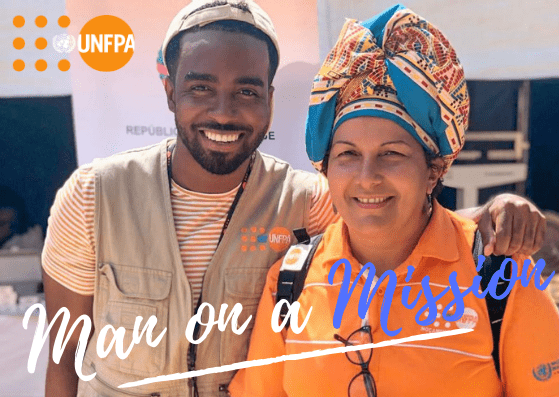On 25 April 2019, Cyclone Kenneth made landfall in northern Mozambique, bringing a path of destruction and damage to the Cabo Delgado and Nampula districts. Tropical Cyclone Kenneth was the second Cyclone to hit Mozambique in a span of just six weeks and the first to make landfall this far north in the country. Entire villages were flattened, and thousands of people were displaced, in a country already dealing with the consequences of drought and Cyclone Idai.”
The devastated communities and survivors were suddenly faced with new and dreadful living conditions. Along with other United Nations partners, UNFPA conducted an assessment mission and began to rapidly deploy emergency reproductive health services and supplies. The UNFPA also immediately launched a Surge call to scale up qualified humanitarian personnel to respond to this urgent emergency need.
Over 6000 miles away, from the shores of the Caribbean, a young man, who was moved by the destruction and devastation in Mozambique answered the call to Surge. Randy Warner, a team member in the UNFPA Sub-regional Office for the Caribbean, based in Barbados, became one of the first UNFPA staff from the sub-region to provide a surge response in Africa.
Randy decided to leave his desk duties and travelled for over 35 hours to Cabo Delgado, the northernmost province of Mozambique to provide well-needed support to the more than 300,000 people affected by this devastating Cyclone. As an Operations Specialist, his main task was to support procurement, human resources management, and operations.
In a brief interview, he tells about his experience in Mozambique.
(Interview has been edited for brevity and clarity.)
Where in Mozambique are you based?
Currently, I am based in Pemba Mozambique.
What was your first impression of Mozambique?
Like any new environment, it was definitely a bit of a cultural adjustment but it was thrilling to be in such a vibrant environment in Africa, seeing women walking with their babies in their Capulana (baby carrier) and the excited children playing and having fun.
Any similarities with the Caribbean - people, places, culture?
Very much so!!! The beaches in Pemba are beautiful, very similar to many of the Caribbean beaches and in this small-town, seafood seems to be the common staple food.
What motivated you to pursue this opportunity?
I wanted to expand my humanitarian experience from a regional to an international level and to build my capacity to better respond to emergencies in the Caribbean. Personally, I always wanted to be in a position to help people or to contribute in some way.
How has your role in the UNFPA Caribbean Sub-Regional Office prepared you for this assignment?
Working in both Programme and Operations in the office has positioned me to be an all-rounder in supporting UNFPA’s Sexual Reproductive Health (SRH) and Gender-based Violence (GBV) humanitarian and emergency interventions.
What’s the best thing about working in Mozambique?
Working directly with the people and seeing their commitment to preserving their culture and rebuilding.
What’s the most challenging thing about working in Mozambique?
I don’t speak Portuguese, so the language barrier in a complex humanitarian emergency was a bit challenging.
What do you hope to get out of the experience on a more personal level?
To be pushed out of my comfort zone and gain valuable learning experiences.
What's your next step for the future?
I am driven to be in a position where I can be innovative in how we respond and meet the needs of the most vulnerable.
Overall, UNFPA response in Mozambique is to ensure access to sexual reproductive health (SRH) services and prevention and response to gender-based violence (GBV). Given the urgent needs, UNFPA is undertaking the following activities:
· Supporting the operationalizing of mobile clinics in hard-to-reach areas.
· Providing over 2000 dignity Kits to the most vulnerable women and girls.
· Providing 19 tents for mobile SRH services.
· Providing 240 emergency reproductive kits to cover the needs of more than 300,000 affected people, including delivery kits for communities and hospitals, post-rape treatment kits, and kits for prevention and treatment of sexually transmitted infections.
· Supporting GBV case management and psychosocial services to GBV survivors.
· Increasing community awareness on GBV prevention and on available SRH and GBV services through volunteers and youth activists.
UNFPA is committed to providing long term recovery and ensuring that the reproductive and maternal health needs of women are not overlooked.


